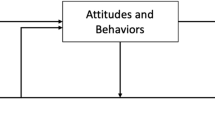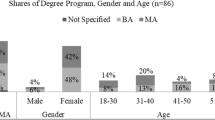Abstract
This study explored instructors’ perceptions, interest, self-efficacy, perceived barriers, and support needs regarding gamification in MOOCs. Both quantitative and qualitative data were collected from an online survey and follow-up interviews. Most participants showed interest in gamification and indicated that they would consider utilizing gaming elements in their future MOOCs. Interestingly, they wanted to gamify their MOOCs mostly to increase social interactions and student retention. Significant differences in self-efficacy and perceptions of gamification were found between younger participants and older participants. The results also revealed significant differences in interest and self-efficacy between participants with prior experience with gamification and those without prior experience. The major barriers to gamifying MOOCs included lack of time, limited knowledge, lack of funding, lack of fit between gamification and the course content, concerns about students’ perceptions of gamification, and concerns regarding the negative effects of gamification. Participants reported that they would need time and funding, guidance from gamification experts, examples of gamified MOOCs, more flexible MOOC platforms in order to successfully gamify their MOOCs.
Similar content being viewed by others
References
Adair, D., Alman, S. W., Budzick, D., Grisham, L. M., Mancini, M. E., & Thackaberry, A. S. (2014). Many shades of MOOCs. Internet Learning, 3(1), 7.
Angers, J., & Machtmes, K. (2005). An ethnographic-case study of beliefs, context factors, and practices of teachers integrating technology. The Qualitative Report, 10, 771–794.
Antonaci, A., Klemke, R., Kreijns, K., & Specht, M. (2018). Get gamification of MOOC right! How to embed the individual and social aspects of MOOCs in gamification design. International Journal of Serious Games, 5(3), 61–78. https://doi.org/10.17083/ijsg.v5i3.255.
Antonaci, A., Klemke, R., Stracke, C. M., & Specht, M. (2017). Gamification in MOOCs to enhance users’ goal achievement. Proceedings of the IEEE Global Engineering Education Conference (pp. 25–28), Athens, Greece. Retrieved from https://dspace.ou.nl/bitstream/1820/7994/1/Antonaci_et_Al_2017_GamificationInMOOCtoEnhanceUsersGoalAchievement.pdf.
Baxter, J. A., & Haycock, J. (2014). Roles and student identities in online large course forums: Implications for practice. The International Review of Research in Open and Distributed Learning, 15(1), 20–40.
Bonk, C. J. (2009). The world is open: How web technology is revolutionizing education. San Francisco, CA: Jossey-Bass, A Wiley Imprint.
Bonk, C. J., Lee, M. M., Reeves, T. C., & Reynolds, T. H. (Eds.). (2015). MOOCs and open education around the world. New York: Routledge.
Bonk, C. J., Lee, M. M., Reeves, T. C., & Reynolds, T. H. (2018). The emergence and design of massive open online courses. In R. A. Reiser & J. V. Dempsey (Eds.), Trends and issues in instructional design and technology (4th ed., pp. 250–258). New York, NY: Pearson Education.
Braun, V., Clarke, V., & Rance, N. (2014). How to use thematic analysis with interview data (process research). In A. Vossler & N. P. Moller (Eds.), The counselling and psychotherapy research handbook. London: Sage.
Bunchball. (2010). Gamification 101: An introduction to the use of game dynamics to influence behavior. Retrieved from https://www.bunchball.com/gamification101.
Chang, J. W., & Wei, H. Y. (2016). Exploring engaging gamification mechanics in massive online open courses. Educational Technology & Society, 19(2), 177–203.
Cho, H., & LaRose, R. (1999). Privacy issues and internet surveys. Social Science Computer Review, 17(4), 421–434. https://doi.org/10.1177/089443939901700402.
Chou, Y.-K. (2015). Actionable gamification: Beyond points, badges, and leaderboards. Milipitas, CA: Octalysis Media.
Christy, K. R., & Fox, J. (2014). Leaderboards in a virtual classroom: A test of stereotype threat and social comparison explanations for women’s math performance. Computers & Education, 78, 66–77. https://doi.org/10.1016/j.compedu.2014.05.005.
Conole, G. (2015). Designing effective MOOCs. Educational Media International, 52(4), 239–252. https://doi.org/10.1080/09523987.2015.1125989.
Cormier, D., & Siemens, G. (2010). Through the open door: Open courses as research, learning, and engagement. Educause Review, 45(4), 30–39.
Creswell, J. W., & Plano-Clark, V. L. (2017). Designing and conducting mixed methods research (3rd ed.). Thousand Oaks, CA: Sage.
de Marcos, L., Domínguez, A., Saenz-De-Navarrete, J., & Pagés, C. (2014). An empirical study comparing gamification and social networking on e-learning. Computers & Education, 75, 82–91. https://doi.org/10.1016/j.compedu.2014.01.012.
Deterding, S., Dixon, D., Khaled, R., & Nacke, L. (2011). From game design elements to gamefulness: Defining “gamification.” Proceedings of the 15th International Academic MindTrek Conference (pp. 9–15). Tampere, Finland.
Dicheva, D., Dichev, C., Agre, G., & Angelova, G. (2015). Gamification in education: A systematic mapping study. Journal of Educational Technology & Society, 18(3), 75–88.
Ertmer, P. A. (2005). Teacher pedagogical beliefs: The final frontier in our quest for technology integration? Educational Technology Research and Development, 53(4), 25–39.
Ertmer, P. A., Ottenbreit-Leftwich, A. T., Sadik, O., Sendurur, E., & Sendurur, P. (2012). Teacher beliefs and technology integration practices: A critical relationship. Computers & Education, 59, 423–435. https://doi.org/10.1016/j.compedu.2012.02.001.
Fini, A. (2009). The technological dimension of a massive open online course: The case of the CCK08 course tools. International Review of Research in Open and Distributed Learning, 10(5), 1–26. https://doi.org/10.19173/irrodl.v10i5.643.
Hamari, J. (2013). Transforming homo economicus into homo ludens: A field experiment on gamification in a utilitarian peer-to-peer trading service. Electronic Commerce Research and Applications, 12(4), 236–245. https://doi.org/10.1016/j.elerap.2013.01.004.
Hamari, J., & Koivisto, J. (2015). Why do people use gamification services? International Journal of Information Management, 35(4), 419–431. https://doi.org/10.1016/j.ijinfomgt.2015.04.006.
Hart, A. (2001). Mann-Whitney test is not just a test of medians: Differences in spread can be important. BMJ, 323(7309), 391–393. https://doi.org/10.1136/bmj.323.7309.391.
Hermans, R., van Tondeur, J., Braak, J., & Valcke, M. (2008). The impact of primary school teachers’ educational beliefs on the classroom use of computers. Computers & Education, 51, 1499–1509. https://doi.org/10.1016/j.compedu.2008.02.001.
Hone, K. S., & El Said, G. R. (2016). Exploring the factors affecting MOOC retention: A survey study. Computers & Education, 98, 157–168.
Huang, B., & Hew, K. F. (2015). Do points, badges and leaderboard increase learning and activity: A quasi-experiment on the effects of gamification. Proceedings of the 23rd International Conference on Computers in Education (pp. 275–280), Hangzhou, China.
Iiyoshi, T., & Kumar, M. S. V. (Eds.). (2008). Opening up education: The collective advancement of education through open technology, open content, and open knowledge. Cambridge: MIT Press.
Jordan, K. (2014). Initial trends in enrolment and completion of massive open online courses Massive Open Online Courses. The International Review of Research in Open and Distributed Learning, 15, 133–160.
Kaplan, A. M., & Haenlein, M. (2016). Higher education and the digital revolution: About MOOCs, SPOCs, social media, and the Cookie Monster. Business Horizons, 59(4), 441–450. https://doi.org/10.1016/j.bushor.2016.03.008.
Kapp, K. M. (2012). The gamification of learning and instruction: Game-based methods and strategies for training and education. San Francisco: Pfeiffer.
Kim, C., Kim, M. K., Lee, C., Spector, J. M., & DeMeester, K. (2013). Teacher beliefs and technology integration. Teaching and Teacher Education, 29, 76–85. https://doi.org/10.1016/j.tate.2012.08.005.
Klemke, R., Eradze, M., & Antonaci, A. (2018). The flipped MOOC: Using gamification and learning analytics in MOOC design - A conceptual approach. Educational Sciences. https://doi.org/10.3390/educsci8010025.
Koivisto, J., & Hamari, J. (2019). The rise of motivational information systems: A review of gamification research. International Journal of Information Management, 45, 191–210. https://doi.org/10.1016/j.ijinfomgt.2018.10.013.
Lieberoth, A. (2015). Shallow gamification: Testing psychological effects of framing an activity as a game. Games and Culture, 10(3), 229–248. https://doi.org/10.1177/1555412014559978.
Mazarakis, A. (2015). Using gamification for technology enhanced learning: The case of feedback mechanisms. Bulletin of the IEEE Technical Committee on Learning Technology, 17(4), 6–9.
McGonigal, J. (2011). Reality is broken: Why games make us better and how they can change the world. Penguin Press.
Milligan, C., & Littlejohn, A. (2017). Why study on a MOOC? The motives of learners and professionals. The International Review of Research in Open and Distributed Learning, 18(2), 92–102. https://doi.org/10.19173/irrodl.v18i2.3033.
Nicholson, S. (2015). A RECIPE for meaningful gamification. In T. Reiners & L. A. Wood (Eds.), Gamification in education and business (pp. 1–20). New York: Springer.
Patton, M. Q. (2002). Two decades of developments in qualitative inquiry: A personal, experiential perspective. Qualitative Social Work, 1(3), 261–283. https://doi.org/10.1177/1473325002001003636.
Porter, S. (2017). To MOOC or not to MOOC: How can online learning help to build the future of higher education?. Oxford: Chandos Publishing.
Romero-Rodríguez, L. M., Ramírez-Montoya, M. S., & González, J. R. V. (2019). Gamification in MOOCs: Engagement application test in energy sustainability courses. IEEE Access, 7, 32093–32101. Retrieved from https://ieeexplore.ieee.org/stamp/stamp.jsp?arnumber=8660423.
Ryan, R. M., & Deci, E. L. (2000). Self-determination theory and the facilitation of intrinsic motivation, social development, and well-being. American Psychologist, 55, 68–78. Retrieved from https://selfdeterminationtheory.org/SDT/documents/2000_RyanDeci_SDT.pdf.
Santos, P. A. (2015). Deep gamification of a university course. Proceedings of SciTecIN 2015 - Sciences and Technologies of Interaction. Coimbra, Portugal. Retrieved from https://scitecin.isr.uc.pt/Proceedings/Papers/VideoJogos/9.pdf.
Saputro, R. E., Salam, S., Zakaria, M. H., & Anwar, T. (2019). A gamification framework to enhance students’ intrinsic motivation on MOOC. Telkomnika, 17(1), 170–178. https://doi.org/10.12928/TELKOMNIKA.v17i1.10090.
Shah, D. (2019). Year of MOOC-based degrees: A review of MOOC stats and trends in 2018. Class Central. Retrieved from https://www.class-central.com/report/moocs-stats-and-trends-2018/.
Simões, J., Redondo, R. D., & Vilas, A. F. (2013). A social gamification framework for a K-6 learning platform. Computers in Human Behavior, 29(2), 345–353. https://doi.org/10.1016/j.chb.2012.06.007.
Tan, M., & Hew, K. F. (2016). Incorporating meaningful gamification in a blended learning research methods class: Examining student learning, engagement, and affective outcomes. Australian Journal of Educational Technology, 32(5), 19–34. https://doi.org/10.14742/ajet.2232.
Veletsianos, G., & Shepherson, P. (2016). A systematic analysis and synthesis of the empirical MOOC literature published in 2013–2015. International Review of Research on Open and Distributed Learning, 17(2), 198–221.
Xing, W., Chen, X., Stein, J., & Marcinkowski, M. (2016). Temporal predication of dropouts in MOOCs: Reaching the low hanging fruit through stacking generalization. Computers in Human Behavior, 58, 119–129. https://doi.org/10.1016/j.chb.2015.12.007.
Zhu, M., Bonk, C. J., & Doo, M.-Y. (2020). Self-directed learning in MOOCs: Exploring the relationships among motivation, self-monitoring, and self-management. Educational Technology Research and Development, 1–21. https://doi.org/10.1007/s11423-020-09747-8.
Zichermann, G. (2010, October 26). Fun is the future: Mastering gamification. GoogleTechTalks.YouTube. Retrieved from https://www.youtube.com/watch?v=6O1gNVeaE4g.
Funding
This research did not receive any specific grant from funding agencies in the public, commercial, or not-for-profit sectors.
Author information
Authors and Affiliations
Corresponding author
Ethics declarations
Conflict of interest
All the authors declared that they have no conflict of interest.
Additional information
Publisher's Note
Springer Nature remains neutral with regard to jurisdictional claims in published maps and institutional affiliations.
Appendices
Appendix A
Interview protocol
-
1.
What types of MOOC do you teach?
-
2.
Have you explored any MOOCs of other instructors or institutions that have incorporated gaming components? If so, what did they contain?
-
a.
Have you seen any other MOOCs that have been gamified to some degree, and, if so, what were they? What impressed you the most about them? Etc.
-
a.
-
3.
Please describe your prior experience with gamification.
-
4.
What do you think are the advantages and disadvantages of gamification, especially in MOOCs?
-
5.
How would you like to gamify your future MOOC? What game elements, activities, or components would you use and why?
-
6.
What types of support or resources do you need to effectively gamify your MOOC?
-
7.
What do you think is the future of gamification related to MOOCs and other forms of open education? Do you have any visions of what is possible?
Rights and permissions
About this article
Cite this article
An, Y., Zhu, M., Bonk, C.J. et al. Exploring instructors’ perspectives, practices, and perceived support needs and barriers related to the gamification of MOOCs. J Comput High Educ 33, 64–84 (2021). https://doi.org/10.1007/s12528-020-09256-w
Published:
Issue Date:
DOI: https://doi.org/10.1007/s12528-020-09256-w




